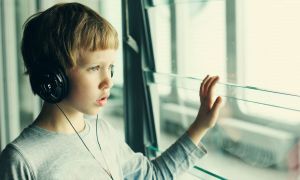Thanks to the common practice of newborn hearing screenings, most parents leave the hospital knowing how well their baby can hear. If their child is deaf or diagnosed with hearing loss, hospital staff and other healthcare professionals can guide the parents toward the appropriate communication and treatment resources.

sounds, noise-isolating headphones
may help.
But sometimes the hearing loss diagnosis is a precursor to another developmental challenge known as autism spectrum disorder (ASD). The Gallaudet Research Institute estimates as many as 40 percent of children with hearing loss exhibit an additional disability and estimates the prevalence of ASD among children who are deaf or have hearing loss to be 1 in 59.
What is autism?
ASD is a complex developmental disorder that appears in early childhood and affects a child’s ability to communicate.
Although children with ASD do not outgrow this disorder, early diagnosis and intervention can significantly improve a child’s outcome, according to the US Centers for Disease Control and Prevention, which tracks rates of autism in kids.
Signs include:
- Lack of or delay in spoken language
- Repetitive use of language and/or motor mannerisms (such as hand flapping or twirling objects)
- Lack of interest in peer relationships
- Lack of eye contact
- Lack of spontaneous or make-believe play
- Persistent fixation on parts of objects
If your child is exhibiting these behaviors, consult your family physician. Although there are no specific medical procedures to test for ASD, your family physician can refer you to specialists who will administer a set of autism-specific behavioral evaluations designed to diagnose the disorder.
Autism and hearing loss: Sometimes a child has both
Because autism affects each child differently, it’s important to understand how the disorder may impact their ability to hear and process sounds. There is a wide range of how autism affects hearing. In some cases, a child may have no hearing loss. Or, a child may have mild, moderate or even significant hearing loss that can be corrected with hearing aids.
Auditory processing disorders and autism
For many, the nerves that are responsible for delivering sound to the brain may malfunction (known as auditory processing disorder, APD), making it hard for the child to make sense of what is being said to them. Children with autism also may struggle with other types of sensory experiences, as well, known as multisensory processing disorder.
Because autism can impact how your child processes sound and noise, your child may struggle with learning and language. An audiologist or specialist in ASD can suggest strategies to help them cope. These strategies may include:
- Hearing aids or other amplification devices, including low-gain hearing aids
- Use of assistive listening devices (ALD)
- Auditory and speech training
- Musical training
- Computer-based tools
- Training with a speech pathologist
Although their hearing may be normal, a child with ASD may process sound differently than other children.
Sound sensitivity in children with autism
Because of the difficulties processing sound, children with autism may be sensitive to certain sounds, known as hyperacusis (a heightened sensitivity to sounds). At the same time, they may have hearing loss in other ranges (for example, high-pitched sounds are very bothersome for the child, but the child can't hear lower-pitched sounds clearly). This can make it tough to parse out if issues are stemming from hearing loss, or not.
Learning which sounds overwhelm your child can help you decide how to respond. Some children do well wearing with noise-cancelling earphones or learning to retreat to a predetermined quiet spaces. In other cases, some kids are under-reactive, meaning they don’t respond appropriately to sounds in their environment. Pediatric audiologists and speech-language pathologists can work with your child to find the right noise comfort levels.
Ear infections and autism
It's unclear if children with autism are more likely to have frequent ear infections, also known as otitis media. However, they may have a harder time expressing that they're in pain, leading to a delayed diagnosis. Knowing the signs of a middle ear infection are important.
Hearing loss misdiagnosed as autism
In some cases, if a child's hearing or vision loss goes undiagnosed and communication problems arise, a child may be suspected to have autism.
Symptoms that overlap include delayed language and social skills, repeating others' speech and poor eye contact. When a child can't hear well, they may become more isolated and less social. This can be misinterpreted as autism.
This is when thorough testing is important. A child with autism is more likely to avoid or dislike several types of sensory inputs (such as tastes or textures), may engage in self-injurious behavior, and exhibit repetitive gestures or odd postures.
How to find help
Autism affects each child differently, and the medical community is still looking for ways to understand this disorder. If you suspect your child’s hearing is affected by their autism spectrum diagnosis, work with your family doctor and hearing healthcare professional to find specialists who can provide options and treatments for the best outcome.
The above is the interpretation of Autism, APD, and Hearing: Understanding the Differences provided by Chinese hearing aid supplier Shenrui Medical. Link https://www.srmcm.com/Blog/Autism,_APD,_and_Hearing_Understanding_the_Differences.html of this article is welcome to share and forward. For more hearing aid related information, please visit Blog or take a look at our Hearing aids products















